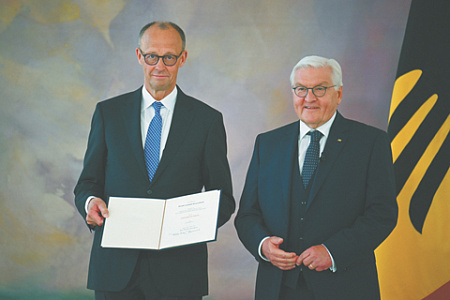
On Tuesday, May 6, Friedrich Merz, the leader of the Christian Democratic and Christian Social Union (CDU/CSU) bloc, was elected the new chancellor of Germany following the results of the second round of voting in the Bundestag. 325 members of Parliament voted for his candidacy. In the event of a negative outcome, one could state a historic failure in the Bundestag.
At 10 a.m. Berlin time, after a brief opening speech by Bundestag President Julia Kleckner, who explained the procedure for electing the chancellor, voting on Merz’s candidacy began. Of the 630 Bundestag deputies, 621 participated in the voting. The voting was electronic and secret.
The coalition of three parties – the CDU, CSU and the Social Democratic Party of Germany (SPD) – has a majority of 12 votes in the current Bundestag. In order to be elected, Merz needed to receive 316 votes with a preponderance of 328 votes in the number of mandates of deputies of the black-red coalition. However, Merz failed to gain an absolute majority in the first round of voting. Only 310 deputies voted for him, with one vote declared invalid.
Three rounds are provided for the election of the Chancellor. Moreover, in the last round, it is enough to get a relative majority of votes for election.
Apparently, Merz did not expect such an outcome of the vote in the first round, and, according to eyewitnesses, after the announcement of the result, he began to take some notes. CDU faction leaders Jens Spahn and CSU Alexander Dobrindt immediately left the meeting room to hold a meeting. Later, Merz also left the Bundestag building and went to the CDU headquarters in Konrad Adenauer House.
A poll conducted by Stern magazine among CDU functionaries showed that they tend to blame the unsuccessful vote for Merz on the SPD and demanded educational work among Social Democratic deputies. There is a certain logic in this, since the Social Democrats, according to commentators on the Second Channel of German television ZDF, were puzzled when Merz announced a new course for his party in migration policy earlier this year, completely breaking with the line of Angela Merkel and adopting even the rhetoric of right-wing populists. Therefore, journalists do not rule out that the appearance of an analysis by the Office for the Protection of the Constitution, which included Alternative for Germany in the list of extremist organizations, was a deliberate step on the part of the SPD leadership (recall that counterintelligence is subordinate to the Interior Ministry, headed by the Social Democrats) in order to prevent a possible rapprochement between the CDU and the right-wing populists.
However, some observers do not rule out that a number of CDU and CSU deputies may not have voted for Merz’s candidacy. The fact is that Merz is considered a political loser in the CDU, who twisted everyone’s arms in order to achieve the chancellorship. In 2002, he lost a rivalry with the then little-known Angela Merkel. Thanks to intrigue, she managed to oust the venerable Helmut Kohl, who rested on his laurels as the unifier of Germany, from the post of head of the party. Realizing that he would not be able to beat Merkel, Merz left politics altogether in 2009 and went into business.
He returned to politics only after Merkel’s voluntary resignation in 2021. And he began to deal with party affairs again about three years before Merkel’s voluntary resignation. After her departure, Merz felt the opportunity to realize his plans to lead the CDU, and then the government.
According to the law, the second round of elections could take place within two weeks. Apparently, Merz decided to take a chance and insisted on a repeat vote on the same day. By agreement of the four parties (CDU, CSU, SPD and the Left Party), a proposal was made to hold a second round of elections. All the deputies of the Bundestag voted for him.
However, while figures from the black-red coalition called for voting for Merz in the interests of democracy and stability, deputies from the Greens and the Left Party emphasized in their speeches that they would vote against his candidacy. They agreed to a shortened time between the first and second rounds of elections only to gain clarity on the issue of Merz’s future. Representatives of Alternative for Germany said they hoped for new elections in which they would be able to improve their positions.
It seems that Merz was so confident of victory that he scheduled his first visits to Warsaw and Paris on May 7. Most likely, the haste with the second round was caused by his unwillingness to cancel the already agreed meetings.
In the second round, Merz received 325 votes out of the required 316. He immediately went to the Bellevue Palace to see the President of Germany. Frank-Walter Steinmeier confirmed him as Chancellor and presented his credentials. Then Merz returned to the Bundestag, where he took the oath of office, and together with future ministers again went to the president for appointments for members of the government. After that, they all went to the Bundestag, where the ministers also took the oath of office.
